Agency Law Analysis: Case Study and Legal Principles in Business Law
VerifiedAdded on 2022/09/09
|7
|1524
|13
Homework Assignment
AI Summary
This assignment provides a comprehensive analysis of agency law, focusing on the establishment of the principal-agent relationship and the authority of agents. It explores key legal concepts such as actual and ostensible authority, fiduciary duties, and the liabilities of principals. The assignment includes a detailed case study involving a drilling engineer and a farmer, examining whether an agency relationship existed and whether the engineer was liable for expenses incurred by the farmer. Relevant case law, including Watteau v. Fenwick and Meinhard v. Salmon, is discussed to illustrate legal principles. The analysis concludes that in the absence of an express or implied agreement, or ratification, no agency relationship was established, thus the claim for expenses was not maintainable. The assignment highlights the significance of agency law within the Australian legal framework.
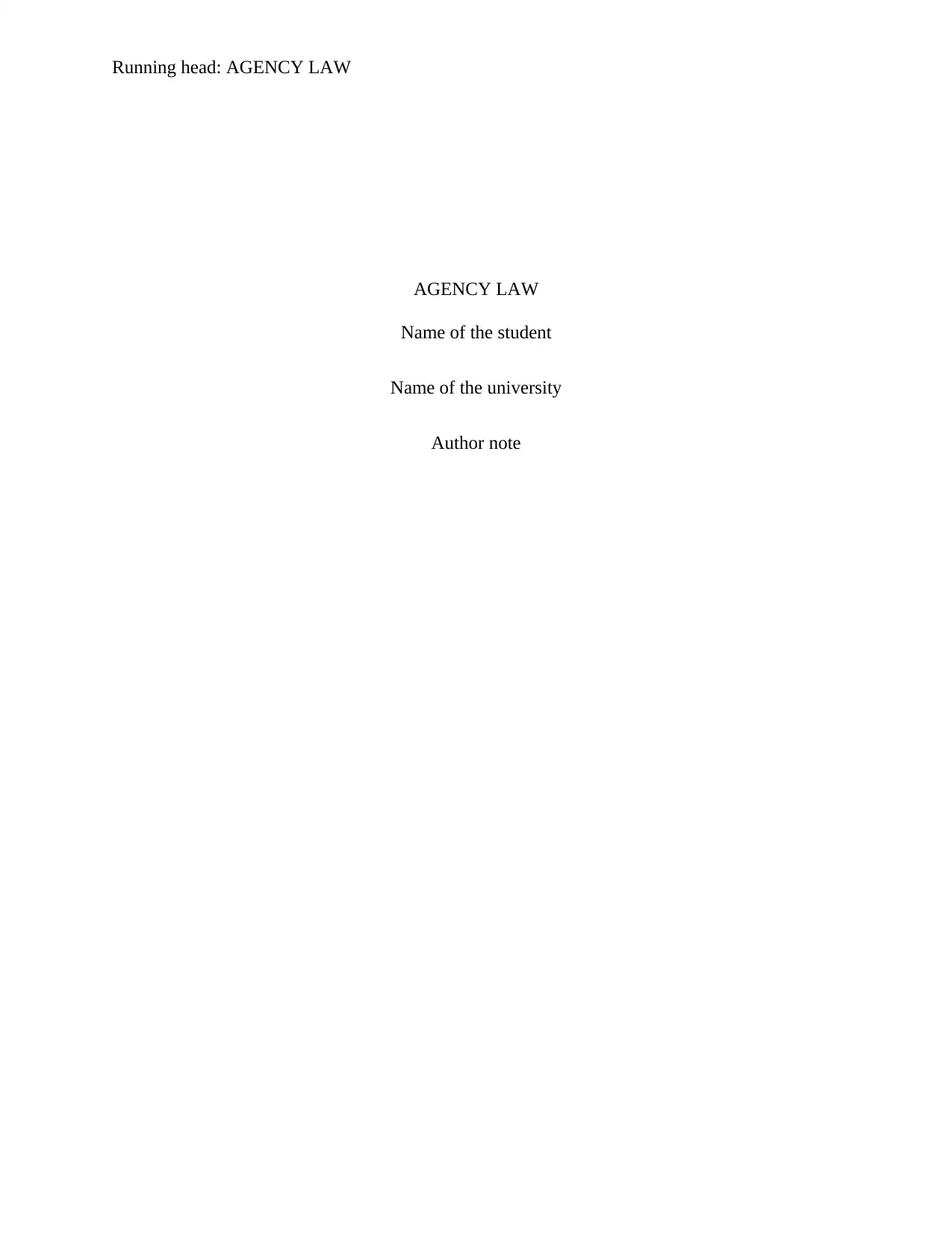
Running head: AGENCY LAW
AGENCY LAW
Name of the student
Name of the university
Author note
AGENCY LAW
Name of the student
Name of the university
Author note
Paraphrase This Document
Need a fresh take? Get an instant paraphrase of this document with our AI Paraphraser
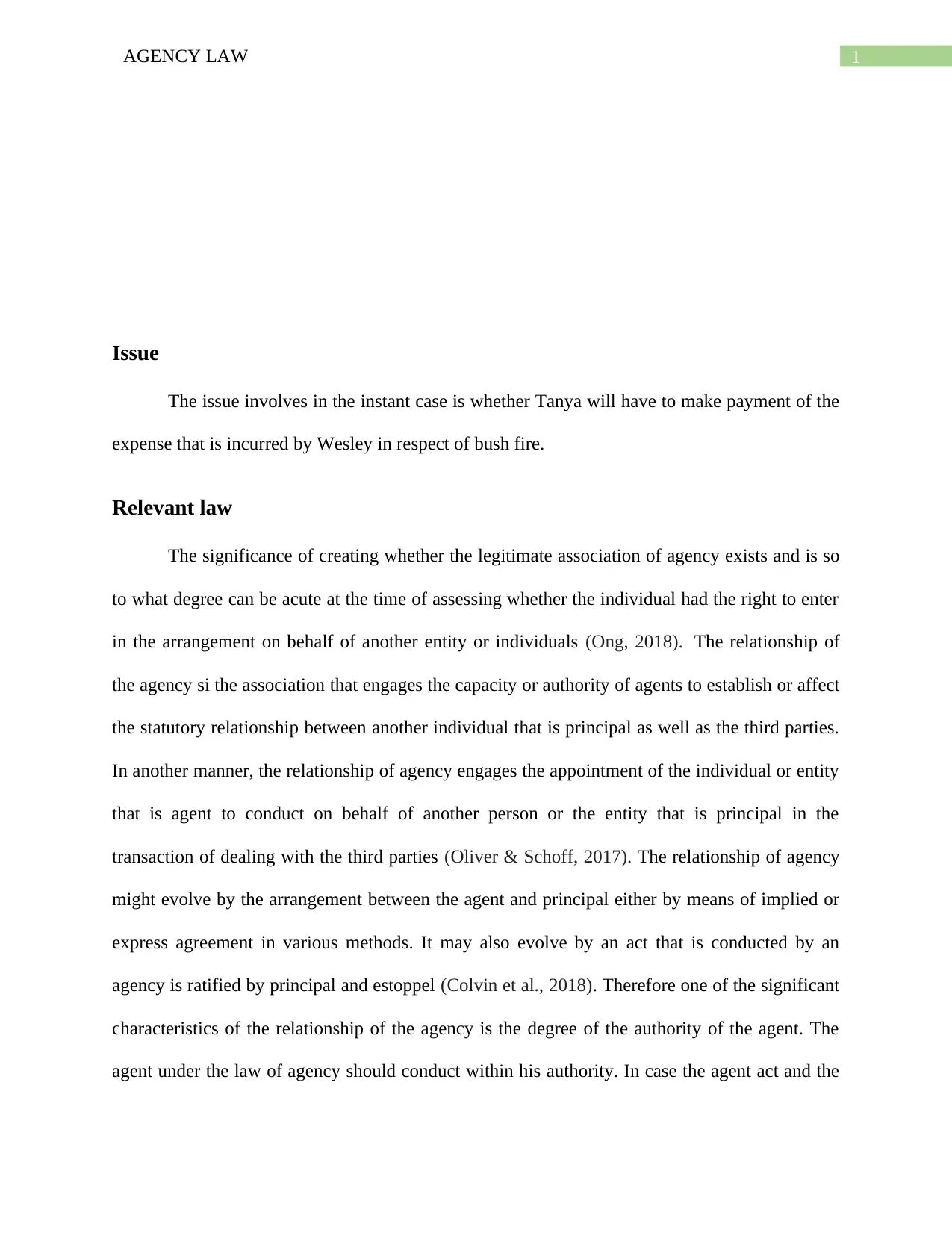
1AGENCY LAW
Issue
The issue involves in the instant case is whether Tanya will have to make payment of the
expense that is incurred by Wesley in respect of bush fire.
Relevant law
The significance of creating whether the legitimate association of agency exists and is so
to what degree can be acute at the time of assessing whether the individual had the right to enter
in the arrangement on behalf of another entity or individuals (Ong, 2018). The relationship of
the agency si the association that engages the capacity or authority of agents to establish or affect
the statutory relationship between another individual that is principal as well as the third parties.
In another manner, the relationship of agency engages the appointment of the individual or entity
that is agent to conduct on behalf of another person or the entity that is principal in the
transaction of dealing with the third parties (Oliver & Schoff, 2017). The relationship of agency
might evolve by the arrangement between the agent and principal either by means of implied or
express agreement in various methods. It may also evolve by an act that is conducted by an
agency is ratified by principal and estoppel (Colvin et al., 2018). Therefore one of the significant
characteristics of the relationship of the agency is the degree of the authority of the agent. The
agent under the law of agency should conduct within his authority. In case the agent act and the
Issue
The issue involves in the instant case is whether Tanya will have to make payment of the
expense that is incurred by Wesley in respect of bush fire.
Relevant law
The significance of creating whether the legitimate association of agency exists and is so
to what degree can be acute at the time of assessing whether the individual had the right to enter
in the arrangement on behalf of another entity or individuals (Ong, 2018). The relationship of
the agency si the association that engages the capacity or authority of agents to establish or affect
the statutory relationship between another individual that is principal as well as the third parties.
In another manner, the relationship of agency engages the appointment of the individual or entity
that is agent to conduct on behalf of another person or the entity that is principal in the
transaction of dealing with the third parties (Oliver & Schoff, 2017). The relationship of agency
might evolve by the arrangement between the agent and principal either by means of implied or
express agreement in various methods. It may also evolve by an act that is conducted by an
agency is ratified by principal and estoppel (Colvin et al., 2018). Therefore one of the significant
characteristics of the relationship of the agency is the degree of the authority of the agent. The
agent under the law of agency should conduct within his authority. In case the agent act and the
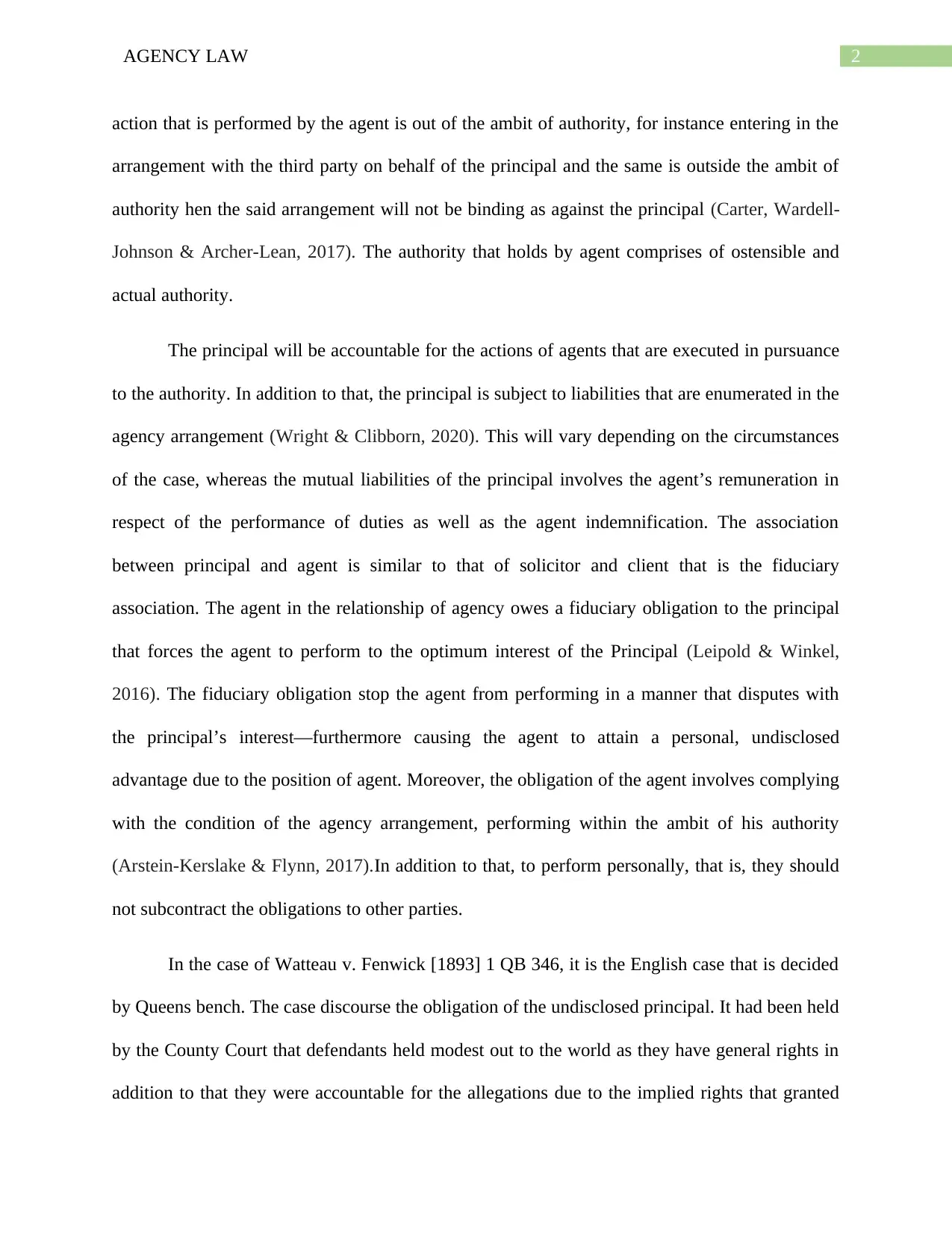
2AGENCY LAW
action that is performed by the agent is out of the ambit of authority, for instance entering in the
arrangement with the third party on behalf of the principal and the same is outside the ambit of
authority hen the said arrangement will not be binding as against the principal (Carter, Wardell-
Johnson & Archer-Lean, 2017). The authority that holds by agent comprises of ostensible and
actual authority.
The principal will be accountable for the actions of agents that are executed in pursuance
to the authority. In addition to that, the principal is subject to liabilities that are enumerated in the
agency arrangement (Wright & Clibborn, 2020). This will vary depending on the circumstances
of the case, whereas the mutual liabilities of the principal involves the agent’s remuneration in
respect of the performance of duties as well as the agent indemnification. The association
between principal and agent is similar to that of solicitor and client that is the fiduciary
association. The agent in the relationship of agency owes a fiduciary obligation to the principal
that forces the agent to perform to the optimum interest of the Principal (Leipold & Winkel,
2016). The fiduciary obligation stop the agent from performing in a manner that disputes with
the principal’s interest—furthermore causing the agent to attain a personal, undisclosed
advantage due to the position of agent. Moreover, the obligation of the agent involves complying
with the condition of the agency arrangement, performing within the ambit of his authority
(Arstein-Kerslake & Flynn, 2017).In addition to that, to perform personally, that is, they should
not subcontract the obligations to other parties.
In the case of Watteau v. Fenwick [1893] 1 QB 346, it is the English case that is decided
by Queens bench. The case discourse the obligation of the undisclosed principal. It had been held
by the County Court that defendants held modest out to the world as they have general rights in
addition to that they were accountable for the allegations due to the implied rights that granted
action that is performed by the agent is out of the ambit of authority, for instance entering in the
arrangement with the third party on behalf of the principal and the same is outside the ambit of
authority hen the said arrangement will not be binding as against the principal (Carter, Wardell-
Johnson & Archer-Lean, 2017). The authority that holds by agent comprises of ostensible and
actual authority.
The principal will be accountable for the actions of agents that are executed in pursuance
to the authority. In addition to that, the principal is subject to liabilities that are enumerated in the
agency arrangement (Wright & Clibborn, 2020). This will vary depending on the circumstances
of the case, whereas the mutual liabilities of the principal involves the agent’s remuneration in
respect of the performance of duties as well as the agent indemnification. The association
between principal and agent is similar to that of solicitor and client that is the fiduciary
association. The agent in the relationship of agency owes a fiduciary obligation to the principal
that forces the agent to perform to the optimum interest of the Principal (Leipold & Winkel,
2016). The fiduciary obligation stop the agent from performing in a manner that disputes with
the principal’s interest—furthermore causing the agent to attain a personal, undisclosed
advantage due to the position of agent. Moreover, the obligation of the agent involves complying
with the condition of the agency arrangement, performing within the ambit of his authority
(Arstein-Kerslake & Flynn, 2017).In addition to that, to perform personally, that is, they should
not subcontract the obligations to other parties.
In the case of Watteau v. Fenwick [1893] 1 QB 346, it is the English case that is decided
by Queens bench. The case discourse the obligation of the undisclosed principal. It had been held
by the County Court that defendants held modest out to the world as they have general rights in
addition to that they were accountable for the allegations due to the implied rights that granted
⊘ This is a preview!⊘
Do you want full access?
Subscribe today to unlock all pages.

Trusted by 1+ million students worldwide
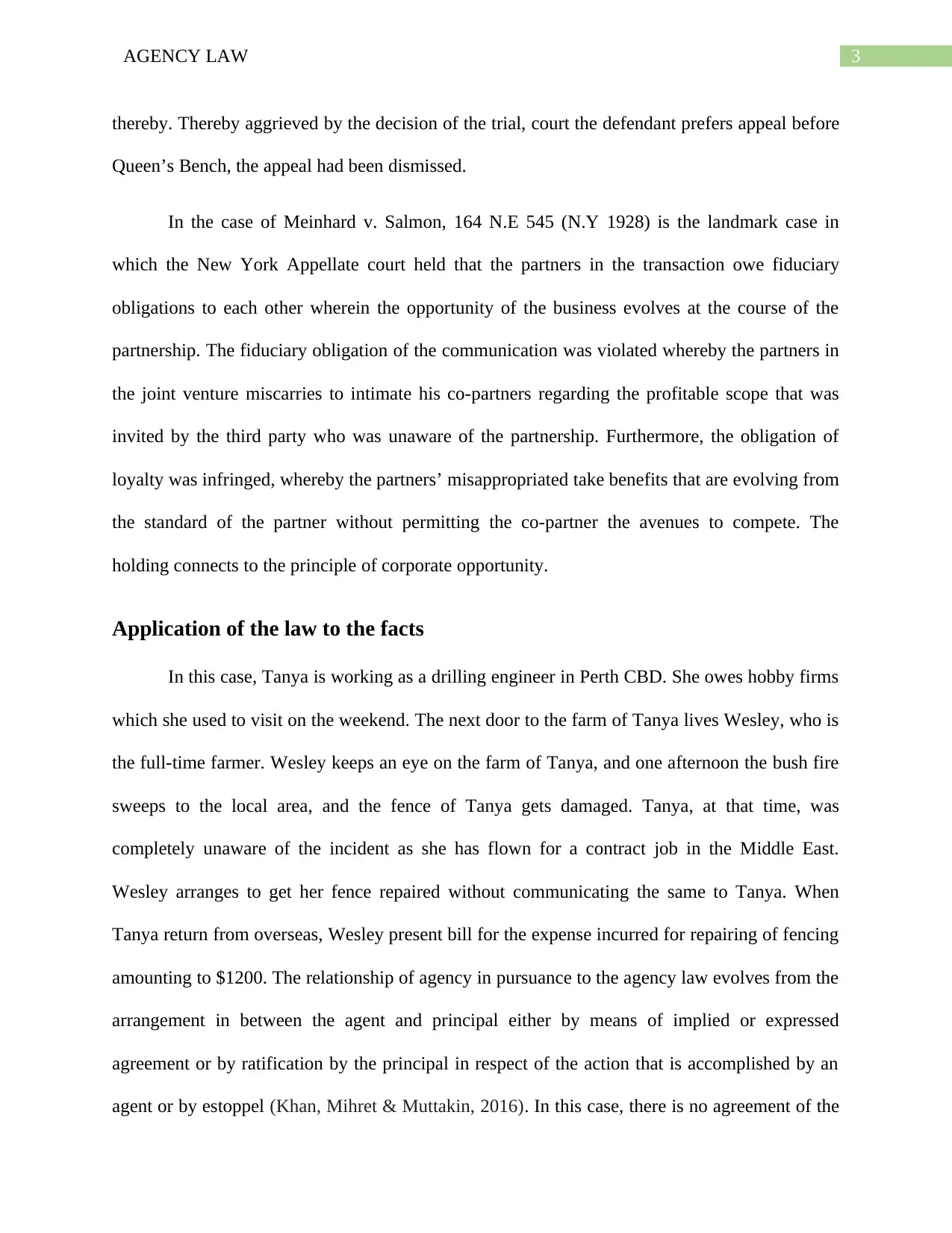
3AGENCY LAW
thereby. Thereby aggrieved by the decision of the trial, court the defendant prefers appeal before
Queen’s Bench, the appeal had been dismissed.
In the case of Meinhard v. Salmon, 164 N.E 545 (N.Y 1928) is the landmark case in
which the New York Appellate court held that the partners in the transaction owe fiduciary
obligations to each other wherein the opportunity of the business evolves at the course of the
partnership. The fiduciary obligation of the communication was violated whereby the partners in
the joint venture miscarries to intimate his co-partners regarding the profitable scope that was
invited by the third party who was unaware of the partnership. Furthermore, the obligation of
loyalty was infringed, whereby the partners’ misappropriated take benefits that are evolving from
the standard of the partner without permitting the co-partner the avenues to compete. The
holding connects to the principle of corporate opportunity.
Application of the law to the facts
In this case, Tanya is working as a drilling engineer in Perth CBD. She owes hobby firms
which she used to visit on the weekend. The next door to the farm of Tanya lives Wesley, who is
the full-time farmer. Wesley keeps an eye on the farm of Tanya, and one afternoon the bush fire
sweeps to the local area, and the fence of Tanya gets damaged. Tanya, at that time, was
completely unaware of the incident as she has flown for a contract job in the Middle East.
Wesley arranges to get her fence repaired without communicating the same to Tanya. When
Tanya return from overseas, Wesley present bill for the expense incurred for repairing of fencing
amounting to $1200. The relationship of agency in pursuance to the agency law evolves from the
arrangement in between the agent and principal either by means of implied or expressed
agreement or by ratification by the principal in respect of the action that is accomplished by an
agent or by estoppel (Khan, Mihret & Muttakin, 2016). In this case, there is no agreement of the
thereby. Thereby aggrieved by the decision of the trial, court the defendant prefers appeal before
Queen’s Bench, the appeal had been dismissed.
In the case of Meinhard v. Salmon, 164 N.E 545 (N.Y 1928) is the landmark case in
which the New York Appellate court held that the partners in the transaction owe fiduciary
obligations to each other wherein the opportunity of the business evolves at the course of the
partnership. The fiduciary obligation of the communication was violated whereby the partners in
the joint venture miscarries to intimate his co-partners regarding the profitable scope that was
invited by the third party who was unaware of the partnership. Furthermore, the obligation of
loyalty was infringed, whereby the partners’ misappropriated take benefits that are evolving from
the standard of the partner without permitting the co-partner the avenues to compete. The
holding connects to the principle of corporate opportunity.
Application of the law to the facts
In this case, Tanya is working as a drilling engineer in Perth CBD. She owes hobby firms
which she used to visit on the weekend. The next door to the farm of Tanya lives Wesley, who is
the full-time farmer. Wesley keeps an eye on the farm of Tanya, and one afternoon the bush fire
sweeps to the local area, and the fence of Tanya gets damaged. Tanya, at that time, was
completely unaware of the incident as she has flown for a contract job in the Middle East.
Wesley arranges to get her fence repaired without communicating the same to Tanya. When
Tanya return from overseas, Wesley present bill for the expense incurred for repairing of fencing
amounting to $1200. The relationship of agency in pursuance to the agency law evolves from the
arrangement in between the agent and principal either by means of implied or expressed
agreement or by ratification by the principal in respect of the action that is accomplished by an
agent or by estoppel (Khan, Mihret & Muttakin, 2016). In this case, there is no agreement of the
Paraphrase This Document
Need a fresh take? Get an instant paraphrase of this document with our AI Paraphraser
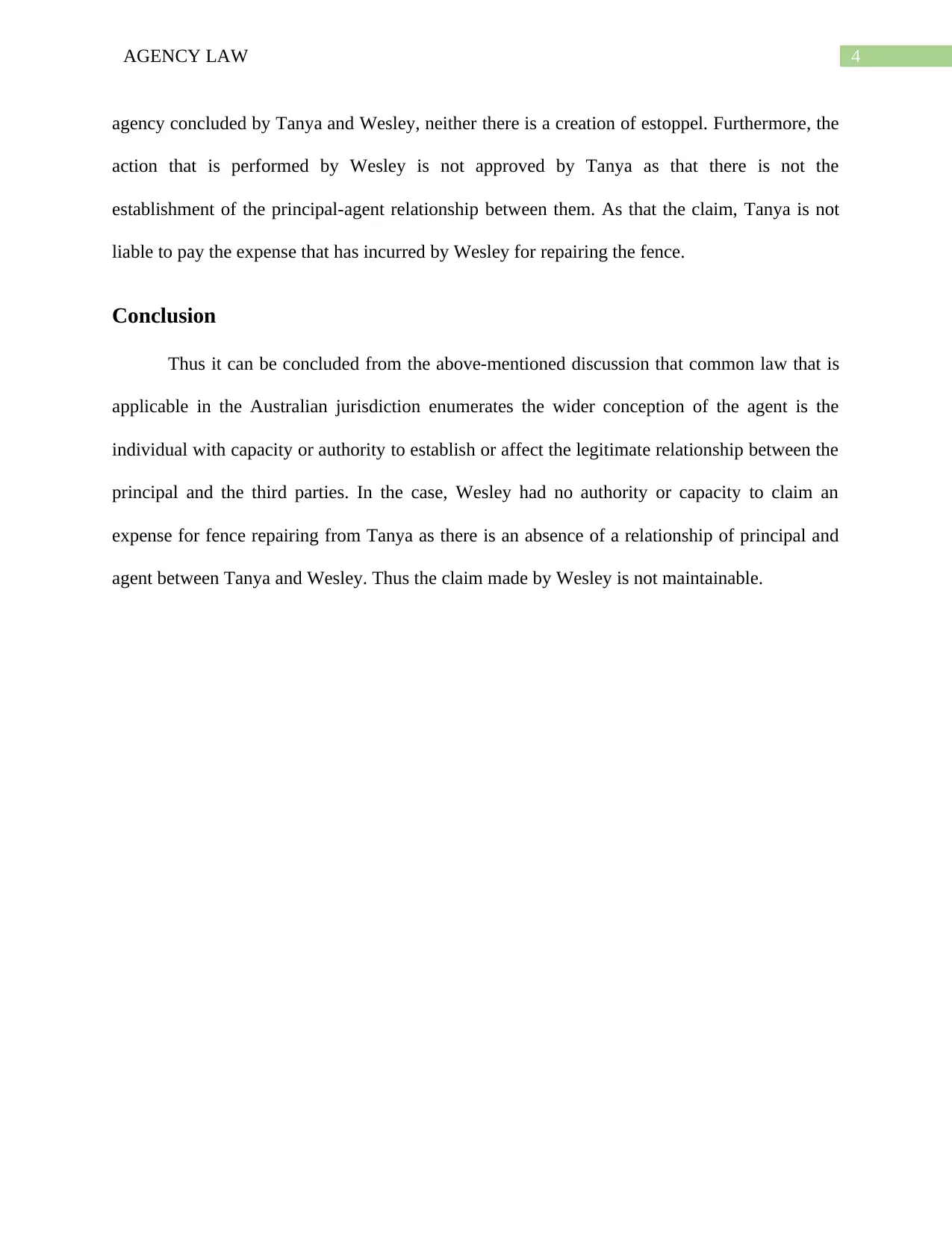
4AGENCY LAW
agency concluded by Tanya and Wesley, neither there is a creation of estoppel. Furthermore, the
action that is performed by Wesley is not approved by Tanya as that there is not the
establishment of the principal-agent relationship between them. As that the claim, Tanya is not
liable to pay the expense that has incurred by Wesley for repairing the fence.
Conclusion
Thus it can be concluded from the above-mentioned discussion that common law that is
applicable in the Australian jurisdiction enumerates the wider conception of the agent is the
individual with capacity or authority to establish or affect the legitimate relationship between the
principal and the third parties. In the case, Wesley had no authority or capacity to claim an
expense for fence repairing from Tanya as there is an absence of a relationship of principal and
agent between Tanya and Wesley. Thus the claim made by Wesley is not maintainable.
agency concluded by Tanya and Wesley, neither there is a creation of estoppel. Furthermore, the
action that is performed by Wesley is not approved by Tanya as that there is not the
establishment of the principal-agent relationship between them. As that the claim, Tanya is not
liable to pay the expense that has incurred by Wesley for repairing the fence.
Conclusion
Thus it can be concluded from the above-mentioned discussion that common law that is
applicable in the Australian jurisdiction enumerates the wider conception of the agent is the
individual with capacity or authority to establish or affect the legitimate relationship between the
principal and the third parties. In the case, Wesley had no authority or capacity to claim an
expense for fence repairing from Tanya as there is an absence of a relationship of principal and
agent between Tanya and Wesley. Thus the claim made by Wesley is not maintainable.
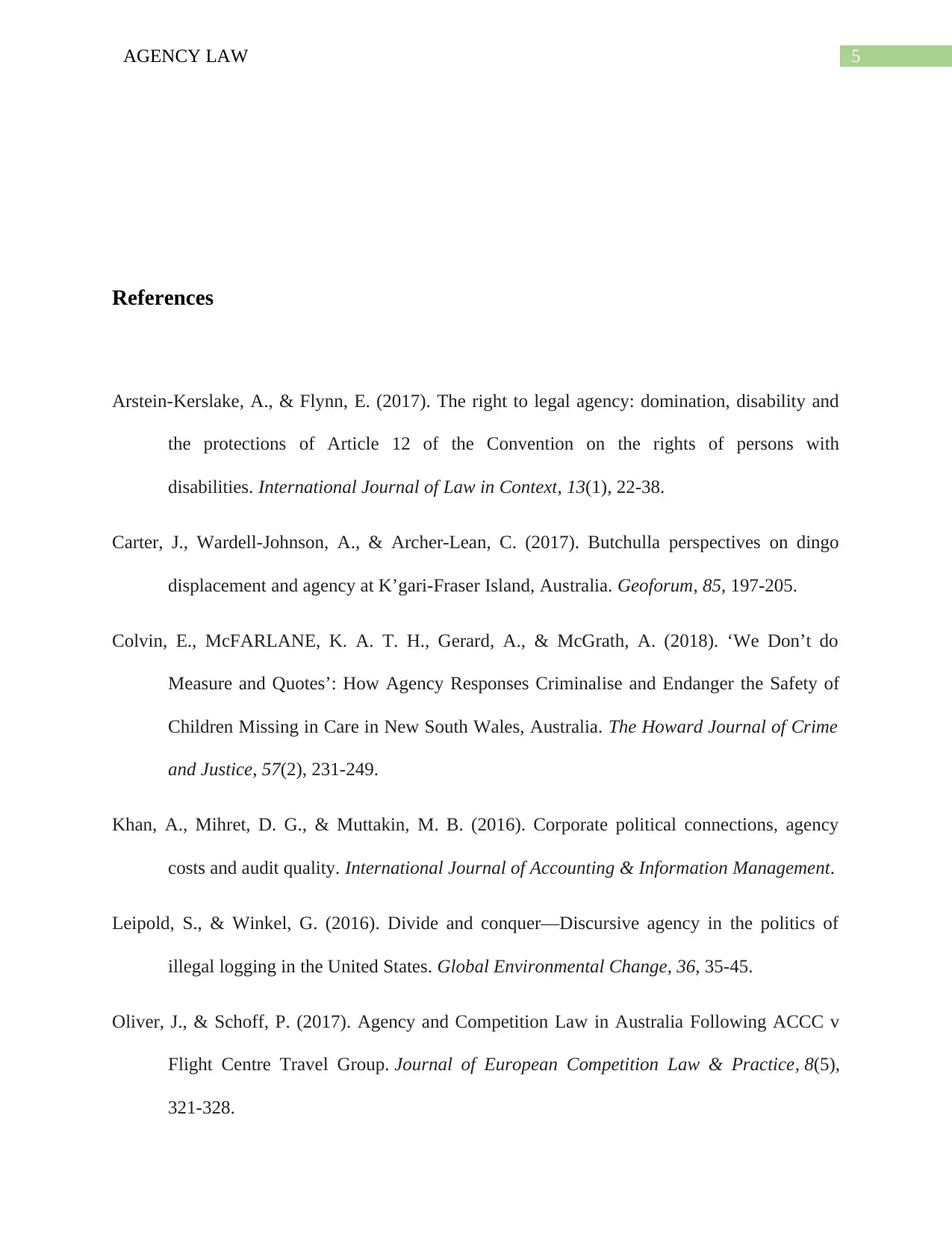
5AGENCY LAW
References
Arstein-Kerslake, A., & Flynn, E. (2017). The right to legal agency: domination, disability and
the protections of Article 12 of the Convention on the rights of persons with
disabilities. International Journal of Law in Context, 13(1), 22-38.
Carter, J., Wardell-Johnson, A., & Archer-Lean, C. (2017). Butchulla perspectives on dingo
displacement and agency at K’gari-Fraser Island, Australia. Geoforum, 85, 197-205.
Colvin, E., McFARLANE, K. A. T. H., Gerard, A., & McGrath, A. (2018). ‘We Don’t do
Measure and Quotes’: How Agency Responses Criminalise and Endanger the Safety of
Children Missing in Care in New South Wales, Australia. The Howard Journal of Crime
and Justice, 57(2), 231-249.
Khan, A., Mihret, D. G., & Muttakin, M. B. (2016). Corporate political connections, agency
costs and audit quality. International Journal of Accounting & Information Management.
Leipold, S., & Winkel, G. (2016). Divide and conquer—Discursive agency in the politics of
illegal logging in the United States. Global Environmental Change, 36, 35-45.
Oliver, J., & Schoff, P. (2017). Agency and Competition Law in Australia Following ACCC v
Flight Centre Travel Group. Journal of European Competition Law & Practice, 8(5),
321-328.
References
Arstein-Kerslake, A., & Flynn, E. (2017). The right to legal agency: domination, disability and
the protections of Article 12 of the Convention on the rights of persons with
disabilities. International Journal of Law in Context, 13(1), 22-38.
Carter, J., Wardell-Johnson, A., & Archer-Lean, C. (2017). Butchulla perspectives on dingo
displacement and agency at K’gari-Fraser Island, Australia. Geoforum, 85, 197-205.
Colvin, E., McFARLANE, K. A. T. H., Gerard, A., & McGrath, A. (2018). ‘We Don’t do
Measure and Quotes’: How Agency Responses Criminalise and Endanger the Safety of
Children Missing in Care in New South Wales, Australia. The Howard Journal of Crime
and Justice, 57(2), 231-249.
Khan, A., Mihret, D. G., & Muttakin, M. B. (2016). Corporate political connections, agency
costs and audit quality. International Journal of Accounting & Information Management.
Leipold, S., & Winkel, G. (2016). Divide and conquer—Discursive agency in the politics of
illegal logging in the United States. Global Environmental Change, 36, 35-45.
Oliver, J., & Schoff, P. (2017). Agency and Competition Law in Australia Following ACCC v
Flight Centre Travel Group. Journal of European Competition Law & Practice, 8(5),
321-328.
⊘ This is a preview!⊘
Do you want full access?
Subscribe today to unlock all pages.

Trusted by 1+ million students worldwide
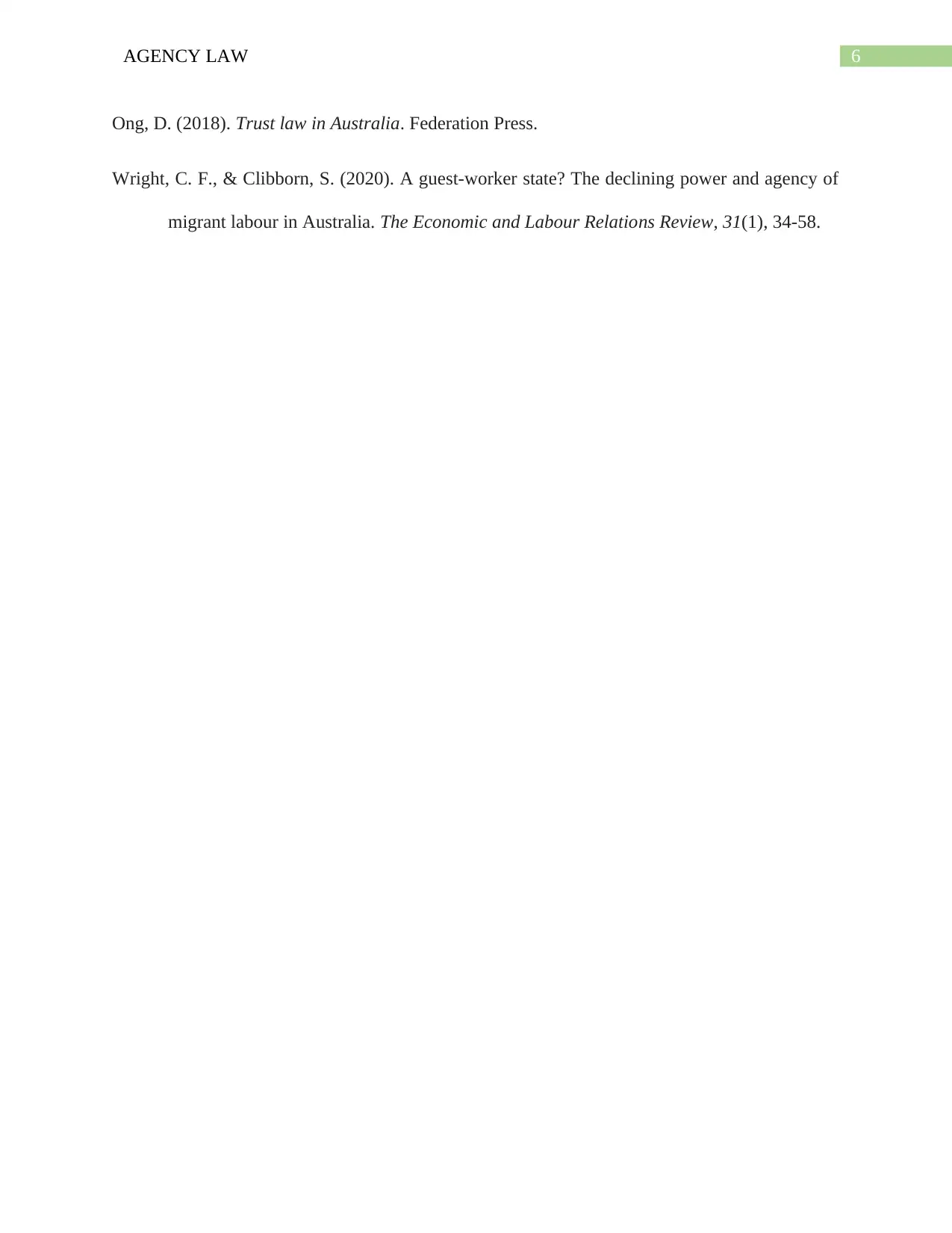
6AGENCY LAW
Ong, D. (2018). Trust law in Australia. Federation Press.
Wright, C. F., & Clibborn, S. (2020). A guest-worker state? The declining power and agency of
migrant labour in Australia. The Economic and Labour Relations Review, 31(1), 34-58.
Ong, D. (2018). Trust law in Australia. Federation Press.
Wright, C. F., & Clibborn, S. (2020). A guest-worker state? The declining power and agency of
migrant labour in Australia. The Economic and Labour Relations Review, 31(1), 34-58.
1 out of 7
Related Documents
Your All-in-One AI-Powered Toolkit for Academic Success.
+13062052269
info@desklib.com
Available 24*7 on WhatsApp / Email
![[object Object]](/_next/static/media/star-bottom.7253800d.svg)
Unlock your academic potential
Copyright © 2020–2026 A2Z Services. All Rights Reserved. Developed and managed by ZUCOL.





